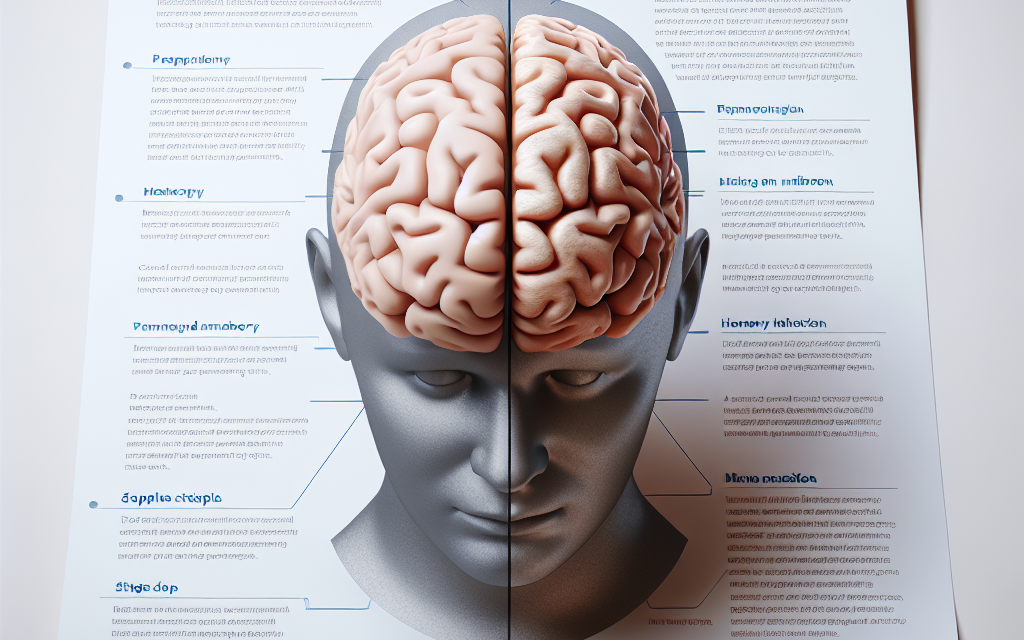Understanding Depression’s Impact on Memory Decline and How to Address It

Depression is a complex mental health disorder that affects millions of people worldwide. While its emotional and psychological impacts are well-documented, its effects on cognitive functions, particularly memory, are less commonly discussed. This article delves into the intricate relationship between depression and memory decline, exploring the underlying mechanisms, the extent of the impact, and potential strategies for mitigation. By understanding these connections, individuals and healthcare providers can better address the cognitive challenges associated with depression.
The Link Between Depression and Memory Decline
Depression is often characterized by persistent sadness, loss of interest in activities, and a range of physical and emotional problems. However, one of the less visible but equally significant effects of depression is its impact on cognitive functions, particularly memory. Research has shown that individuals with depression often experience difficulties with memory, which can manifest as forgetfulness, difficulty concentrating, and challenges in retaining new information.
Several studies have highlighted the connection between depression and memory decline. For instance, a study published in the journal “Psychological Medicine” found that individuals with depression had a higher risk of developing memory problems compared to those without depression. The study suggested that the severity and duration of depressive episodes could exacerbate memory decline, indicating a dose-response relationship.
Moreover, depression can affect different types of memory, including short-term memory, long-term memory, and working memory. Short-term memory involves the temporary storage of information, while long-term memory refers to the ability to store and retrieve information over extended periods. Working memory, on the other hand, is the ability to hold and manipulate information in the mind for short periods. Depression can impair all these types of memory, leading to significant cognitive challenges.
Understanding the link between depression and memory decline is crucial for developing effective interventions. By recognizing the cognitive symptoms of depression, healthcare providers can tailor treatment plans to address both the emotional and cognitive aspects of the disorder.
Mechanisms Underlying Depression-Related Memory Decline
The relationship between depression and memory decline is complex and involves multiple biological, psychological, and environmental factors. Several mechanisms have been proposed to explain how depression affects memory, including changes in brain structure and function, alterations in neurotransmitter systems, and the impact of stress hormones.
One of the key biological mechanisms is the alteration of brain structure and function. Depression has been associated with changes in the hippocampus, a brain region critical for memory formation and retrieval. Studies using neuroimaging techniques have shown that individuals with depression often have reduced hippocampal volume, which can impair memory processes. Additionally, depression can affect the prefrontal cortex, a brain region involved in executive functions and working memory.
Neurotransmitter systems also play a crucial role in the relationship between depression and memory decline. Depression is often linked to imbalances in neurotransmitters such as serotonin, dopamine, and norepinephrine, which are essential for mood regulation and cognitive functions. These imbalances can disrupt communication between neurons, leading to memory impairments.
Stress hormones, particularly cortisol, are another important factor. Depression is associated with dysregulation of the hypothalamic-pituitary-adrenal (HPA) axis, leading to elevated cortisol levels. Chronic exposure to high cortisol levels can damage the hippocampus and other brain regions involved in memory, contributing to cognitive decline.
Understanding these mechanisms is essential for developing targeted interventions to mitigate the impact of depression on memory. By addressing the underlying biological and psychological factors, healthcare providers can help individuals with depression improve their cognitive functions and overall quality of life.
Case Studies and Real-World Examples
To illustrate the impact of depression on memory decline, it is helpful to examine real-world examples and case studies. These examples provide valuable insights into the lived experiences of individuals with depression and highlight the challenges they face in managing cognitive symptoms.
One notable case study involved a 45-year-old woman diagnosed with major depressive disorder. She reported significant difficulties with memory, including forgetting appointments, misplacing items, and struggling to recall recent conversations. Neuropsychological assessments revealed impairments in both short-term and working memory, consistent with her self-reported symptoms. The case study highlighted the importance of addressing cognitive symptoms in the treatment of depression, as they significantly impacted the woman’s daily functioning and quality of life.
Another example comes from a longitudinal study that followed a cohort of older adults with depression over several years. The study found that individuals with depression experienced a more rapid decline in memory and other cognitive functions compared to those without depression. This decline was particularly pronounced in individuals with recurrent depressive episodes, suggesting that repeated exposure to depressive symptoms can have a cumulative effect on cognitive health.
These case studies underscore the need for comprehensive treatment approaches that address both the emotional and cognitive aspects of depression. By incorporating cognitive assessments and interventions into treatment plans, healthcare providers can better support individuals with depression in managing their symptoms and improving their cognitive functions.
Strategies for Mitigating Memory Decline in Depression
Addressing memory decline in individuals with depression requires a multifaceted approach that combines pharmacological, psychological, and lifestyle interventions. By targeting the underlying mechanisms of depression-related memory decline, these strategies can help improve cognitive functions and enhance overall well-being.
Pharmacological interventions often involve the use of antidepressant medications, which can help restore neurotransmitter balance and improve mood. Some antidepressants, such as selective serotonin reuptake inhibitors (SSRIs), have been shown to have positive effects on cognitive functions, including memory. However, it is important to note that the effects of antidepressants on memory can vary depending on the individual and the specific medication used.
Psychological interventions, such as cognitive-behavioral therapy (CBT), can also be effective in addressing memory decline in depression. CBT focuses on identifying and changing negative thought patterns and behaviors, which can help improve mood and cognitive functions. Additionally, cognitive remediation therapy, a specialized form of therapy that targets cognitive deficits, can be beneficial for individuals with depression-related memory impairments.
Lifestyle interventions, including regular physical exercise, a healthy diet, and adequate sleep, can also play a crucial role in mitigating memory decline. Exercise has been shown to promote neurogenesis and improve cognitive functions, while a balanced diet rich in omega-3 fatty acids, antioxidants, and other nutrients can support brain health. Ensuring sufficient sleep is also essential, as sleep disturbances are common in depression and can exacerbate memory problems.
By combining these strategies, individuals with depression can improve their cognitive functions and enhance their overall quality of life. It is important for healthcare providers to work closely with individuals to develop personalized treatment plans that address both the emotional and cognitive aspects of depression.
Conclusion: Key Takeaways
Depression is a multifaceted disorder that affects not only emotional well-being but also cognitive functions, particularly memory. Understanding the link between depression and memory decline is crucial for developing effective interventions that address both the emotional and cognitive symptoms of the disorder.
The mechanisms underlying depression-related memory decline are complex and involve changes in brain structure and function, neurotransmitter imbalances, and the impact of stress hormones. By addressing these underlying factors, healthcare providers can help individuals with depression improve their cognitive functions and overall quality of life.
Real-world examples and case studies highlight the significant impact of depression on memory and underscore the need for comprehensive treatment approaches. By incorporating pharmacological, psychological, and lifestyle interventions into treatment plans, individuals with depression can mitigate memory decline and enhance their well-being.
Ultimately, addressing memory decline in depression requires a holistic approach that considers the unique needs and experiences of each individual. By working together, individuals and healthcare providers can develop effective strategies to manage depression and improve cognitive health.





